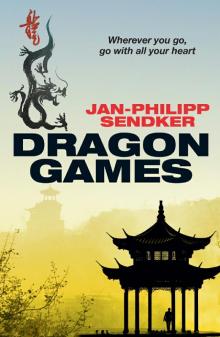- Home
- Jan-Philipp Sendker
The Language of Solitude Page 23
The Language of Solitude Read online
Page 23
Let me know if I can be of help to you in any other way.
I’m keeping my fingers crossed for you, and look forward to hearing from you.
Love,
Paul
The next day he had another two emails from Shanghai.
Subject: URGENT
Received: 0:56
paul,
thank you very much for your edits. i made all the changes you suggested. your chinese is really amazing. i’m going to pudong today. a friend of mine knows a teahouse there where it’s no problem to get online and you won’t leave any trace. there’s always a risk. when i get scared i’ll think of my mother and my father, that’s what i did when i was writing the piece as well. i’m very excited. what will happen when i press “send”? it’s the finality of it that shocks me. that will be that. do you understand what i mean, or do you think i’m being silly? are we the only ones affected or have there been problems like this in other villages? who will have the courage to comment on my story, to react to it in some way? i’ll write with details as soon as anything happens.
think of me and wish me luck.
yours, feeling not at all like a hero,
yin-yin
Subject: DONE!
Received: 4:17
done! done! done! i just posted my piece: i feel free. no fear, just relief. i feel like my father: i have nothing to lose. even if they find out that i wrote the piece, what can they do to me? arrest me? lock me up? i am nothing but an insignificant little music student. i am not afraid.
will be in touch again soon,
yin-yin
No fear. Only relief. Paul was glad to read her messages, but at the same time, the more he thought about it, the more uneasy he began to feel. Yin-Yin had dared to tell the public her story; her piece was somewhere online, accessible to every Internet user in the world. Read by a few and then forgotten? Or forwarded from one Internet user to another? If so, over a few hours it could spread at the lightning speed that only this medium, with its incomparable power of magnification, was capable of. It was no longer in her hands, and there was no going back. He congratulated Yin-Yin once more on her courage and her fantastic piece of work, wrote that she was a hero on a small scale in his eyes, regardless of whether she felt like one or not, and asked her to be in touch.
He began his daily routine but anxiously logged in to his email several times before the evening, which he normally didn’t do. His inbox remained empty.
The next morning he tried to call Yin-Yin on her cell phone but couldn’t get through, so he left a voice message.
Three hours later, his telephone rang.
“Where is Yin-Yin?”
Paul was not sure whom he was speaking to. “Is that Mr. Weidenfeller?”
“Yes. Where is she?”
“How am I supposed to know that?”
“Because you’ve spent more time with her in the last ten days than I have,” Weidenfeller replied in an agitated tone.
“I’ve been back in Hong Kong for a week,” Paul responded, irritated. He did not feel like having a fight with a jealous man. “We haven’t spoken to each other since then.”
“Do you know where she could be?”
“Perhaps she’s gone to her parents’?”
“No, I’ve rung their house already.” Weidenfeller was gradually beginning to sound more worried than angry.
“How long have you been looking for her?”
“We were meant to meet yesterday evening. But she wasn’t there when I arrived to pick her up. Her roommate saw her in the morning before she left the house; when she came back, Yin-Yin had gone. She had taken her laptop and her cell phone, and no one knows where she is. I even went to the conservatory. She hasn’t been in touch with her brother for days.” He said nothing for a moment, then added, in an almost pleading tone, “Might you have some idea where she is?”
“No,” Paul replied, feeling uncomfortable.
“Tell me, when did you last hear from her?”
“When we said good-bye in Shanghai,” Paul lied. If Yin-Yin had not told her boyfriend anything about posting her story online, she must have had her reasons. It was not for him to tell Weidenfeller. “Maybe she stayed the night with a friend who she’s rehearsing with today. I’m sure everything will become clear in the next few hours,” he said, even though he didn’t think so.
“I hope so. Let me know if you hear anything,” Weidenfeller said, giving Paul his cell phone number.
“Of course. Please do the same if you have news.”
Paul made some tea, picked up his cordless telephone, sat in the garden, and rang Chen the lawyer in Shanghai.
“Paul Leibovitz here. Do you remember me?”
“But of course. Your girlfriend, Wu Yin-Yin, came to see me a few days ago and—”
Paul interrupted him. “She took your advice and posted a piece about Sanlitun and the fate of her mother on the Internet. There’s been no sign of her since yesterday.”
Silence.
“Did she do it from a public Internet café?” Chen asked after a long pause.
“Yes. As far as I know, she made a special trip to a teahouse in Pudong so that no one there would know her and she would leave no traces.”
“Strange,” the lawyer murmured quietly. “She was probably not careful enough about writing the piece, and betrayed her identity in it.”
“No. I read it. It’s very good, and doesn’t give any clue to the identity of the writer. How could someone have found out that Yin-Yin wrote it?”
“I don’t know. She must have made a mistake,” Chen said, deep in thought.
“She sent me the piece. I thought it was—”
“She what?”
“She sent me the draft of the piece,” Paul repeated, confused.
“How?”
“By email of course.”
“Damn! How could she!” Chen exclaimed. “That was her mistake. Her emails were being monitored.”
Paul groaned in shock.
“That is the only explanation. She must have aroused suspicion before. Did you have the feeling that you were being followed in Yiwu or in Shanghai?”
“No,” Paul said. “But I wasn’t looking out for that. Maybe the break-in was related?”
“What break-in?”
“An intruder broke into Yin-Yin’s hotel room in Yiwu.”
“Why didn’t you tell me anything about that?” Chen said accusingly.
“I didn’t think it was connected to our investigations. I thought it was a burglar in the hotel,” Paul said apologetically. He stood up in his agitation and started pacing up and down his garden.
“How did you conduct your investigations in Yiwu? Apart from talking to my colleague Gao and this journalist? Did you make contact with any officials?”
“No. I looked up lots of information about Minamata disease on the Internet, about the symptoms and causes, and also stuff about Sanlitun.”
“Were you using your own computer?”
“No. I . . .” Paul was barely able to finish his sentence. How could he have been so naïve? How could he have forgotten where he was? That first night he had even used the duty manager’s computer. It wouldn’t have taken long the next morning to find out what Paul had been using the computer for. And it was easy to make the connection between him and Yin-Yin. He had been thoughtless and careless. Yin-Yin was now paying the price for his negligence.
Chen swore quietly.
“Do you think Yin-Yin has been arrested?” Paul asked.
“That’s what I’m assuming.”
“But why? What could they accuse her of?”
“It could be many things. Inciting trouble. Endangering national security. Preventing officials from doing their jobs. Slander. Or, as is very common in such cases, the possession of state secrets. There’s a three-year jail sentence just for that.”
Paul sank down into a chair, knocking a teapot and a cup over. “That’s ridiculous. None of those things can be true.�
��
“Mr. Leibovitz, don’t be so naïve,” the lawyer replied in an irritated tone of voice. “The police don’t need a reason at all to detain a person. The laojiao system allows it to lock up every citizen of this country for up to four years without trial by judge or the assistance of an attorney. The procedures of the criminal justice system do not apply in this case; the sentence can be imposed by any old police station.”
“I know, I know,” Paul said in a low voice. “But these laws came about in the time of the Cultural Revolution. I thought they had been abolished long ago.”
“Lawyers and judges have been calling for that for years, but the lobbying by the security services has been too powerful. I just heard about a case in Henan Province where a farmer was arrested and the judge released him, but the police promptly rearrested him and sent him into forced labor for two years. Legally! Hold on a minute . . .” Chen’s voice suddenly sounded muffled, as though he was holding his hand over the telephone. A few seconds later, he was back. “Sorry, that was my secretary. Maybe we’re worrying too much. I have some contacts in the police headquarters. I’ll call them and be in touch with you again as soon as I can.”
* * *
Paul dared not let the telephone out of his hand. He carried it from the terrace in the garden to the kitchen, the bedroom, and the bathroom as he went about his day. He took his phone with him when he went shopping in the village; as he was just checking how ripe the mangoes were at Mrs. Ting’s, it rang.
“Bad news,” Chen said, sounding serious.
Paul was gripped by fear. Whatever had happened to Yin-Yin, he was partly responsible. “What have you found out?”
“Nothing.”
“Didn’t you say you had bad news?”
“That is bad news. I called up two close contacts at the criminal investigation department who both owe me a favor, and they asked around, but even they couldn’t tell me anything. That means that Yin-Yin or the Sanlitun case is regarded as so important by the police that only very few people are in the know. Or”—the lawyer paused for a moment—“or she was taken away by someone else.”
“By whom?”
“If only I knew.”
“Do you have any suspicions?” Paul asked carefully.
“No. The security services in Hangzhou or in Yiwu could have arrested her. Or Sanlitun’s security personnel.”
Paul’s normally sturdy guts protested; he felt nauseated. “What— What can we— I mean, what, what should we do?” he stammered helplessly, feeling like an idiot.
“Wait. Search for her. I don’t know.”
The lawyer’s bewilderment shocked Paul. “I’ll come to Shanghai,” he said impulsively.
“Hmm . . .” was Chen’s initial reaction. After a pause, he added, “I don’t want to stop you, but be careful. Look out for anyone watching you. For people following you. Or for people offering their services as a driver. You’ll have to assume that your phone is being tapped and that your hotel room will be searched.”
“Yes, of course. But can we still meet?”
The lawyer hesitated. “I’m afraid I can’t help you any further at the moment.”
“For a coffee, at least?” Paul asked, disappointed.
“Call me as soon as you’re in the city and we’ll see.”
Paul looked at his watch. He had to speak to Christine urgently. If he didn’t dawdle now, he could catch the two thirty ferry.
He called her and asked if she had time for a cup of tea. To his surprise, she suggested coming to Lamma to spend the afternoon with him and cook a meal together. It was very quiet in the office, so she wasn’t needed, and she missed him.
He bought the ingredients for one of her favorite dishes, gong bao chicken with peanuts, and went to meet her at the ferry. Her smile when she saw him. Christine seemed to float as she ran toward him. Even though there was not even the hint of a curve to her belly yet, Paul had the feeling that the pregnancy was making her younger and ever more beautiful from day to day. He took her into his arms, but she seemed to notice from the way he held her and kissed her that something was not quite right.
“What’s happened?” she wanted to know, giving him a piercing look.
“Yin-Yin has probably been arrested.”
There was no reproach in her look, more the disappointment of a person who had seen misfortune approaching and had hoped right up to the last moment that it would not arrive. “I want to get to your house as soon as possible,” she said, taking his hand.
At the house, Paul made some iced tea from scratch, put a deck chair on the terrace for Christine, fetched a chopping board, a sharp knife, the chicken breasts, garlic, spring onions, and ginger, and sat next to her. The air in the garden was still, warm, and humid; Paul loved weather like this. Christine, on the other hand, looked pale and exhausted.
“Should we go inside instead?”
“I’d love to, if you had an air conditioner . . .” She gave a tired smile. “Tell me more about what you know.”
Paul peeled the garlic and ginger and told her about his conversations with Weidenfeller and Chen.
“It doesn’t sound as though the lawyer wants to have very much more to do with this business.”
“No.” Paul cut the chicken breasts into small cubes and the spring onions into long strips. “No, he doesn’t.” He tried not to let his disappointment show.
“Who else could help her?”
“I don’t know.” He wiped the sweat off his brow.
“Come let’s go into the house. I’ll put the fans on.”
Christine perched on the bar stool by the kitchen counter and relished the cool air from the fan on her warm body. Paul put salt, soy sauce, Shaoxing rice wine, a teaspoon of potato flour, and a little water into a bowl, stirred the mixture well, and then marinated the chicken in it.
“And now you want to go to Shanghai,” she said after a while. It was not a question, more a statement.
Paul looked up in amazement. “How do you know that?”
“I know you. You have a bad conscience because you feel responsible.”
He nodded mutely.
“You think that you encouraged her to defend herself, to put herself in danger, and now you’re abandoning her at the very moment that she’s in trouble.”
“Isn’t that right?” he asked uncertainly.
“Yes.”
“Really? Do you think so?”
“I don’t think that she could have gone so far without you.”
Paul prepared the sauce pensively. He poured light and dark soy sauce, Chinese rice vinegar, sesame oil, a little sugar, flour, and chicken stock into a bowl, and mixed it well. Christine set the table.
He lit the gas stove and warmed some oil in a wok. When it was hot enough, he threw a handful of dried chilies and Sichuan peppers in, and tipped the wok from side to side until they were crispy.
“It smells wonderful already,” Christine said, escaping back into the cool airstream from the fan.
Paul added the chicken to the wok, then the rest of the ingredients. Concentrating on cooking did him good; the smell of the frying garlic, ginger, and spring onions relaxed him. To finish the dish, he added the sauce and the peanuts. Shortly after that, the steaming dish of gong bao chicken was on the table; the cubes of chicken were coated with a thin layer of light-brown sauce, with dark-red chilies among them—it looked delicious.
Christine served the warm rice from the rice cooker. They sat in silence opposite each other, then Paul suddenly reached across the table and gave her a kiss. “Thank you.”
“What for? You cooked the meal.”
“For everything.”
She helped herself to two pieces of chicken and put them into her mouth. “Did you know,” she asked, chewing away with enjoyment, “that this dish was called something else during the Cultural Revolution? It was called ‘quick-fried chicken cubes.’ ”
Paul shook his head. “Why?”
“Because it’s named aft
er a Qing dynasty official.”
He nearly chocked. “I suspect there can’t be many countries in which even the names of dishes can fall into political disfavor.”
Christine balanced a peanut between her chopsticks and put it in her mouth. “What do you want to do in Shanghai? You surely can’t think that you’ll be able to find out who is responsible for her disappearance?”
“No, probably not. I want to talk to Weidenfeller and Xiao Hu and discuss what we can do. And I want to go to Yiwu to talk to your brother. I don’t know how he’ll react when he finds out what has happened to Yin-Yin. I’m afraid his son won’t be very much help.”
“That’s true.”
“You don’t object?” he asked.
“Would that change anything?” Christine was smart enough not to expect an answer to her question. She continued: “I’m not comfortable with it, but you always say that I mustn’t worry.”
“And you mustn’t. In the worst-case scenario they’ll deport me and send me straight back to Hong Kong.”
“For the first time, I’m actually feeling something akin to responsibility for my brother’s family. I’m grateful that you’re helping.” After a short pause, she added, “When will you go?”
“Tomorrow.”
“Have you got my grandfather’s amulet on you?”
Paul pulled it out from under his white T-shirt. “Always.”
“Should I come with you?”
“You? While you’re pregnant? Absolutely not. I’ll be back in three days anyway.”
XVI
* * *
The drive had taken around two hours, she guessed, maybe more. They had handcuffed and blindfolded her and put her in the back of a minivan. She could tell by the sound of the sliding door.
She had heard rumors about “dark houses,” a whole system of them spread around the country, where people could disappear for years without an obvious reason, secret prisons used by the secret police. But she had never given it much thought. Now she was in a basement room, cold and uncomfortable. Two chairs, a bed with a mattress but no sheets, a small closet, a lightbulb hanging from the ceiling, a dirty toilet in a corner. There was a tiny window high up.

 The Language of Solitude
The Language of Solitude A Well-Tempered Heart
A Well-Tempered Heart The Art of Hearing Heartbeats
The Art of Hearing Heartbeats The Far Side of the Night
The Far Side of the Night Whispering Shadows
Whispering Shadows Dragon Games
Dragon Games The Long Path to Wisdom
The Long Path to Wisdom